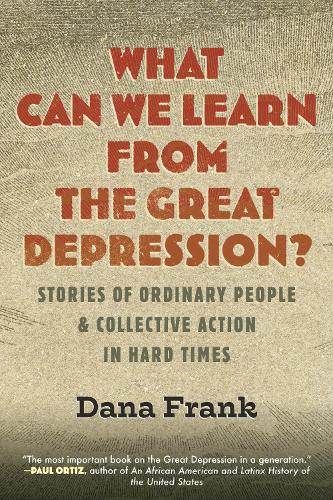
What Can We Learn from the Great Depression: Stories of Ordinary People & Collective Action in Hard Times
(Paperback)
Available Formats
Publishing Details
What Can We Learn from the Great Depression: Stories of Ordinary People & Collective Action in Hard Times
By (Author) Dana Frank
Beacon Press
Beacon Press
23rd September 2025
United States
Classifications
General
Non Fiction
330.9730916
Physical Properties
Paperback
336
Width 152mm, Height 229mm
Description
4 stories of resilience, mutual aid, and radical rebellion that will transform how we understand the Great Depression 4 stories of resilience, mutual aid, and radical rebellion that will transform how we understand the Great Depression Drawing on little-known stories of working people, What Can We Learn from the Great Depression amplifies voices that have been long omitted from standard histories of the Depression era. In four tales, Professor Dana Frank explores how ordinary working people in the US turned to collective action to meet the crisis of the Great Depression and what we can learn from them today. Readers are introduced to the 7 daring Black women who worked as wet nurses and staged a sit-down strike to demand better pay and an end to racial discrimination the groups who used mutual aid, cooperatives, eviction protests, and demands for government relief to meet their basic needs the million Mexican and Mexican American repatriados who were erased from mainstream historical memory, while (often fictitious) white "Dust Bowl migrants" became enshrined the Black Legion, a white supremacist fascist organization that saw racism, antisemitism, anti-Catholicism, and fascism as the cure to the Depression While capitalism crashed during the Great Depression, racism did not and was, in fact, wielded by some to blame and oppress their neighbors. Patriarchy persisted, too, undermining the power of social movements and justifying women's marginalization within them. For other ordinary people, collective action gave them the means to survive and fight against such hostilities. What resulted were powerful new forms of horizontal reciprocity and solidarity that allowed people to provide each other with the bread, beans, and comradeship of daily life. The New Deal, when it arrived, provided vital resources to many, but others were cut off from its full benefits, especially if they were women or people of color. What Can We Learn from the Great Depression shows us how we might look to the past to think about how we can shape the future of our own failed economy. These lessons can also help us imagine and build movements to challenge such an economy-and to transform the state as a whole-in service to the common good without replicating racism and patriarchy.
Reviews
A well-crafted work of social history that highlights little-known aspects of preWorld War II America.
Kirkus Reviews
[What Can We Learn from the Great Depression paints] a picture that calls for more campfires of the resistance from San Francisco to New York, from blue states to red states, and everywhere that Woody Guthrie, Lead Belly and Billie Holiday sang to and for the American people and to and for folks around the world.
CounterPunch
In this urgent and illuminating book, Dana Frank shares stories revealing the collective power of marginalized workers, the real threat of fascism and the racism that fuels it, and the capacity of ordinary people to find and care for each other despite these deep structural divisions. She is that rare scholar able to mobilize the lessons of history against our present catastrophe.
Robin D. G. Kelley, author of Hammer and Hoe
The US lurched between democratic renewal and outright fascism in the 1930s. . . . Frank skillfully shows how working-class people experimented with new forms of organizing. . . . Our understanding of the Great Depression and its contested legacies will never be the same thanks to this brilliant and timely book.
Paul Ortiz, author of An African American and Latinx History of the United States
Frank translates her rich archival discoveries of formidable historical episodes into lucid storytelling that offers inspiration and warnings for our own times. Do not sleep on the riveting chapter on wet nurses in Chicago who organized a novel strike to amplify the value of their domestic and reproductive labor in 1937. As Frank centers these Black women, she imagines a movement in which the most inconsequential can be lifted so that all work and all workers can be treated with dignity and respect.
Tera W. Hunter, author of Bound in Wedlock
In this honest, often surprising book, Frank reframes the 1930s as a moment in which common individuals struggled to make sense of a world in collapse. She reminds us of the precarity and promise of democracy in a nation prone to racial logics and xenophobic outbursts. We need this reminder, now, more than ever.
Matt Garcia, author of Eli and the Octopus
In four seemingly disparate accounts of grassroots collective action during the Great Depression, Frank reveals much about how politically nimble regular people have been, to both heroic and rancid ends. Enjoy this beautifully crafted book, then get to work democratizing the economy and society.
Gwendolyn Mink, coauthor of Fierce and Fearless
Author Bio
Dana Frank is Professor Emerita of History at the University of California, Santa Cruz. A well-regarded senior historian, she is the author of many books on labor, women, and social justice in the US and Honduras. Her writing has appeared in the New York Times, Washington Post, Guardian, The Nation, Foreign Affairs, and many other publications, and she has testified before both the US Congress and Canadian Parliament.
